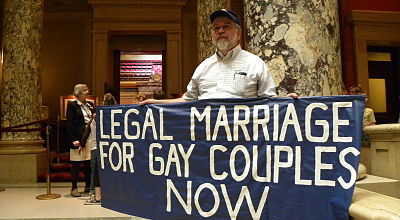Same-Sex Marriage Deception Exposed in Minnesota
Alliance Defending Freedom and ActRight Legal Foundation attorneys represented numerous state legislators and the committee supporting passage of the amendment in a legal challenge to the faulty ballot title.
“Minnesotans deserve to have free and fair elections, and they deserve to know precisely what they are voting for,” says Alliance Defending Freedom (ADF) Senior Counsel Jordan Lorence, who argued before the high court as lead counsel in the case, Limmer v. Ritchie, last month.
“Because the legislature wrote a ballot title for the marriage amendment, no official in the executive branch has any authority to replace or modify that title—especially not with one that incorrectly describes the amendment’s effect,” Lorence explains. “Voters have the right to know that the amendment is designed to protect the ‘recognition of marriage solely between one man and one woman,’ as the legislature accurately specified. The court has done the right thing in restoring that language to the ballot.”
The Minnesota Legislature wrote the ballot title for the amendment, as the state constitution empowers it to do, but Secretary of State Mark Ritchie later changed the ballot title to describe the intention of the amendment as “limiting the status of marriage to opposite-sex couples,” saying that his language was consistent with Attorney General Lori Swanson’s chosen statement of purpose and effect. ADF and ActRight Legal Foundation attorneys argued that neither official has the authority to override the Legislature’s title.
“Allowing the secretary of state, an executive branch officer with no constitutional authority over the form and manner of proposed constitutional amendments, to simply ignore the Legislature’s action in proposing and passing a title to accompany a ballot question on a constitutional amendment potentially risks interfering with the Legislature’s constitutional authority,” the Minnesota Supreme Court wrote in its opinion.
“We conclude that when the legislature has included a title for a ballot question in the bill proposing a constitutional amendment, the ‘appropriate title’ the secretary of state must provide for that ballot question is the title designated by the Legislature. As a result, the secretary of state exceeded his authority … when he provided titles for the ballot questions different from those passed by the legislature.”














































